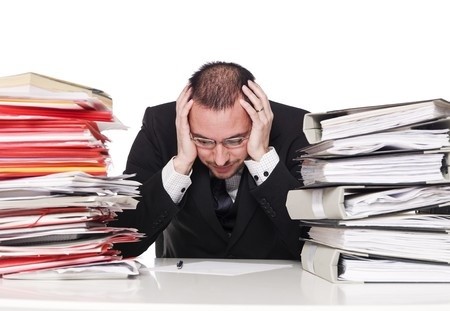Messy Desk, Messy Mind: How Clutter Can Help or Hurt Productivity
By On
Don’t Judge a Person with a Messy Desk on Superficial Evidence.
You walk into an executive’s office (let’s call him “Mr. Mess”) and notice piles of paper on the desk and files strewn around the cabinets. You think, “What a mess! This exec must be a ditz. Can he be trusted with detailed reports?” However, when you ask for a particular report, Mr. Mess goes to a pile, shuffles through a few layers, smiles, and hands you exactly what you want. You’re astounded. He’s efficient and productive.
In this case, a messy desk doesn’t indicate a messy mind. This manager has a visual image of the location of each item. He puts his hand out and grabs what he wants. In fact, the clutter may provide comfort, rather than distraction. He’s someone who enjoys seeing and knowing where everything is. In such cases, stacks of documents, files, and open books can serve to trigger memory, attention, and action. Clearly, for this executive and others like him, clutter doesn’t act as a barrier to performance.
A Messy Desk May Indicate Other Critical Vulnerabilities to Productivity
For others, however, a messy office reflects the inability to organize. These executives fight a constant battle to control the clutter in their work and life spaces. Their messy desks reflect their difficulties with visual or organizational thinking and executive functioning. They may face a number of vulnerabilities in other areas.
- Prioritizing: identifying the most important or time-sensitive tasks that need to be completed
- Sequencing: arranging items or ideas in a logical order
- Managing time: being aware of schedules and staying on track
- Visualizing the big picture: discerning the “forest” from the “trees”
- Visual memory and organizing: ordering and finding objects in space
If you experience such difficulties, things begin to pile up, and you forget about the important announcements, invoices, or requests. You may lose important items.
As the year comes to a close, it’s a good time to ask yourself whether you are as efficient and productive as you could be.
Tips to Improve Productivity and Tame the Mess
If you need to make improvements, pay attention to the amount and type of clutter that you face, and consider the possible actions you can take. Begin by asking yourself the following questions:
· What needs to be organized or filed for end-of-the-year reports?
· What needs to be shredded?
· What nonessential or extra supplies can be shared or discarded?
· Which files could be scanned and archived?
· Can the mess be attacked by spending an hour or two this week, or does the cleanup/reorganization require more time?
· Do you need desktop organizers—such as stack able file trays or holders for pencils, sticky notes, paper clips, etc.—or does it work better for you to use desk-drawer organizing trays to keep the desk surface clear?
· Which reports, magazines, and announcements have been sitting on your desk unread for months—and how important is it that you read them?
· Would a shelf, bookcase, bulletin board, or portable file be useful?
· Do you need assistance from an expert, such as a professional organizer?
Often, desk or office clutter (and related stress) can build, especially during the holidays, when gatherings and activities take more of your time. But you can avoid starting a new year with old unwanted papers, files, and announcements.
Take one step at a time, and set some rules
For example, maybe you save, but never read, unessential conference announcements or magazines. If so, your rule could be “If I haven’t read these during the last month, I will just recycle them.” Or you could designate a box for those documents, labeling it “Nice, but not necessary … read when time available.” When the box is full—even if you still haven’t read the material—it’s times to recycle it.
Although some people say a messy desk is a sign of creativity, only you can determine whether the mess hinders your productivity and motivation. If it does, taking the time (even 15 minutes, twice a week) and taking action to clear the clutter can save you time and stress—and increase your effectiveness in the coming year.
*******************************
Dr. Markel Offers Value-Driven Keynotes and Breakouts.
Download Dr. Markel’s Speaker One Sheet: GeriMarkelCorporateOneSheet-Print
Book Dr. Markel to Speak at Your Next Event? Connect Today!
